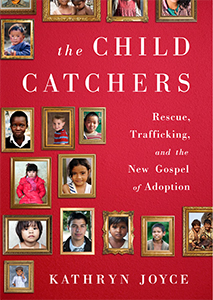I recently read Kathryn Joyce’s The Child Catchers: Rescue, Trafficking, and the New Gospel of Adoption. The book’s premise can be summarized by this excerpt from the description on Kathryn Joyce’s website:
To tens of millions of evangelicals, adoption has become a new front in the culture wars: a test of “pro-life” bonafides, a way to reinvent compassionate conservatism on the global stage, and a means to fulfill the “Great Commission” mandate that Christians evangelize the nations. Influential leaders fervently promote a new “orphan theology,” urging followers to adopt en masse, with little thought for the families these “orphans” may actually have. Christian adoption activists have added moral weight to a multi-billion dollar adoption industry intent on increasing the “supply” of adoptable children, both at home and overseas.
The Child Catchers is a shocking exposé of what the adoption industry has become and how it got there, told through deep investigative reporting and the heartbreaking stories of individuals who found that their own, and their children’s, well-being was ultimately irrelevant in a market driven by profit and now, pulpit command.
There’s a lot to say about The Child Catchers, but my overriding reaction is intense frustration that so little has been learned and implemented following Guatemala’s shutdown. Many of the cases cited by Kathryn Joyce take place in Ethiopia and involve corrupt facilitators in-country, who coerce and trick before the final faked paperwork ever makes it as far as the US Embassy. As you probably know if you’re reading this, Ethiopia replaced Guatemala as the adoption “hot spot,” and adoption numbers there sky rocketed after Guatemala closed.
Will nothing ever change?
My second reaction is more of a question: Why should anyone’s religious beliefs enter into the debate over corruption in international adoption? Adoption practices either are corrupt, or they’re not. If they are, shut them down. Or better, don’t allow them to start, which is the intention of the Hague Treaty.
If adoption practices are not corrupt, then it really shouldn’t be anyone’s business why someone chooses to adopt, or what religion they embrace. Religious freedom is one of the hallmarks of the US. Honestly, I’m curious to know what Kathryn Joyce hopes to accomplish by criticizing evangelical Christians for their beliefs and practices. Because my guess is that such criticism in fact may produce the opposite effect of what she intended. Instead of reform, it may (understandably) cause (some) evangelical Christians to feel attacked, leading to a posture of defense.
As I noted above, the book’s description states “[t]o tens of millions of evangelicals, adoption has become the new front in the culture wars,” implying that tens of millions of evangelicals are adopting children internationally through nefarious means. This simply isn’t true. The number of intercountry adoptions to the United States in 2012 in total was fewer than 9,000. If the “tens of millions” refers to evangelicals who are concerned about children in need, then wonderful. Otherwise, the figure seems exaggerated and misleading.
Overall, Joyce’s book is thoroughly researched and well-written, albeit to me as an adoptive mother, unfairly one-sided. Adoption for my husband and me, and every other adoptive parent I know (and that’s a lot of people), is about creating a family. That said, I respect Joyce’s point of view and her right to tell the story she feels compelled to report.
One quibble, though, with The Child Catchers, in general: Joyce devotes much ink to the case of “self-declared missionary” Laura Silsby, who illegally removed children from Haiti after the earthquake, even while admitting Silsby was an outlier who chose not to follow the rules. This was true of several “players” Joyce profiled, who seem extreme in every way, not only regarding adoption.
Also: I was sorry and confused to read that some US birth mothers affected by the 50s “Baby Scoop,” now feel that parents who opt for open adoption are doing so only as a way to ingratiate themselves to birth mothers, and perhaps convince them to relinquish their babies. As many of you reading this know, our family chose open adoption with our kids because we believe it’s healthiest—mentally, psychologically, spiritually, and just the right thing to do—for everyone involved. I’m very sad to learn that some birth mothers may feel we have an ulterior motive or immoral agenda.
Here are links to interviews and articles for more information. The first is a cogent rebuttal by adoptive parent and Senior Counsel at the Center for American Law and Justice, David French. The remainder feature Kathryn Joyce and The Child Catchers:
From the National Review Online: Is the Left Launching an Attack on Evangelical Adoption? by David French.
An interview with Kathryn Joyce on NPR’s Fresh Air: How Evangelical Christians Are Preaching the New Gospel of Adoption.
Kathryn Joyce’s 2011 article in The Nation: The Evangelical Adoption Crusade.
Kathryn Joyce’s 2011 article in The Atlantic: How Ethiopia’s Adoption Industry Dupes Families and Bullies Activists.
An book excerpt in the May 2013 Mother Jones: Orphan Fever.
Finally, a link to an MSNBC interview conducted by Melissa Harris-Perry with Tarikuwa Lemma, a young woman featured in the book who was adopted from Ethiopia at 13 and is now an adult. Scroll around the site to find the interview with Kathryn Joyce and Karen Moline, board member from PEAR (People for Ethical Adoption Reform). I especially liked what PEAR board member Karen Moline said, as an adoptive mother to a son from Vietnam, circa 2001 I believe. Something like “American parents are so trusting that they never, ever believe that bad people motivated by greed could be involved in adoption.” Yes, that would be my husband and me, in the beginning of our process, before we knew anything.
On that note. Still praying for the families of the Guatemala 900, waiting, at a minimum, for more than five years. ~




 ShareThis
ShareThis